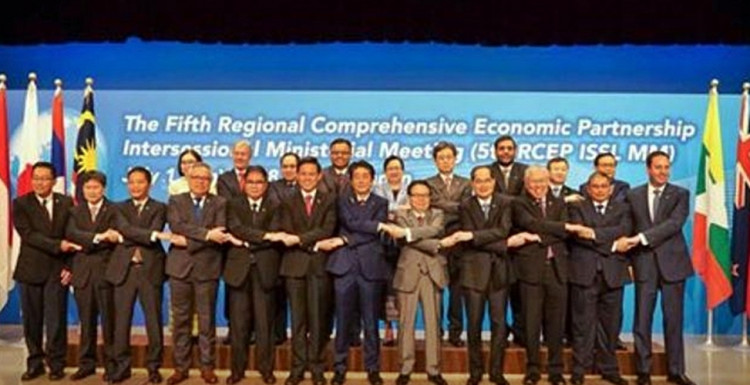The 10 member states of the Association of Southeast Asian Nations (ASEAN) and its six largest Asian trading partners (including China) are on the cusp of creating the largest and richest economic bloc in world history. The United States under its protectionist and anti-trade president is excluded from the bloc.
The new Regional Comprehensive Economic Partnership (RCEP) free trade agreement will be an alternative to the Trans-Pacific Partnership (TPP) spurned by Donald Trump, who abandoned the agreement in January 2017.
Trade ministers and officials from the 16 Asian countries involved in RCEP agreed Sunday to accelerate negotiations and reach a basic agreement on the pact by the end of this year. The 10 ASEAN member states consist of Brunei, Cambodia, Indonesia, Laos, Malaysia, Myanmar, the Philippines, Singapore, Thailand, and Vietnam. The six other states that will be part of RCEP are Australia, China, India, Japan, South Korea and New Zealand.
When ratified, RCEP will be the most powerful trading bloc in the world, covering nearly half of the global economy. In 2017, RCEP member states had a total Gross Domestic Product (GDP, PPP) of $49.5 trillion, or 39 percent of the world's GDP, and a population of 3.4 billion.
Estimates by PricewaterhouseCoopers (PwC) place the GDP, PPP of RCEP member states at nearly $250 trillion by 2050. RCEP's share of the global economy could account for half of the estimated $0.5 quadrillion global GDP (PPP) by 2050.
During last weekend's meetings in Tokyo, Prime Minister Shinzo Abe urged fellow leaders to work for an early conclusion of the RCEP in the face of the increasingly hostile Trump administration. Japan is seeking to take leadership in the RCEP.
"As we are faced with concerns of the rise of protectionism in the world, all of us in Asia must unite, and our future depends on whether we can keep hoisting our flagship principle of free and fair trade," said Abe at the meeting. He said RCEP is getting more and more attention from the rest of the world amid American protectionism, so "let us be as one and achieve a free, fair and rules-based market in this region."
In a joint statement, the Asian ministers said RCEP is especially important "in view of the current global trade environment, which faces serious risks from unilateral trade actions and reactions, as well as their debilitating implications on the multilateral trading system." They also promised to seek breakthroughs in politically challenging areas.
They acknowledged differences that need to be resolved, but see reaching an accord as evidence of Asia's commitment to defending free trade under threat from Trump's ignorant and destructive America First campaign promise.
"The ministers recognized the importance of swiftly and successfully concluding RCEP negotiations," the ministers said in their statement. They also want "a package of year-end outcomes," pointing to "serious risks" from trade restrictive steps from the Trump administration.
"This is indeed a moment for us to seize the opportunity against a global backdrop where we are facing headwinds in the trade relationships and the trade regimes," said Singapore's Minister for Trade and Industry Chan Chun Sing. He noted that RCEP will be a powerful statement to show what its member countries stand.






